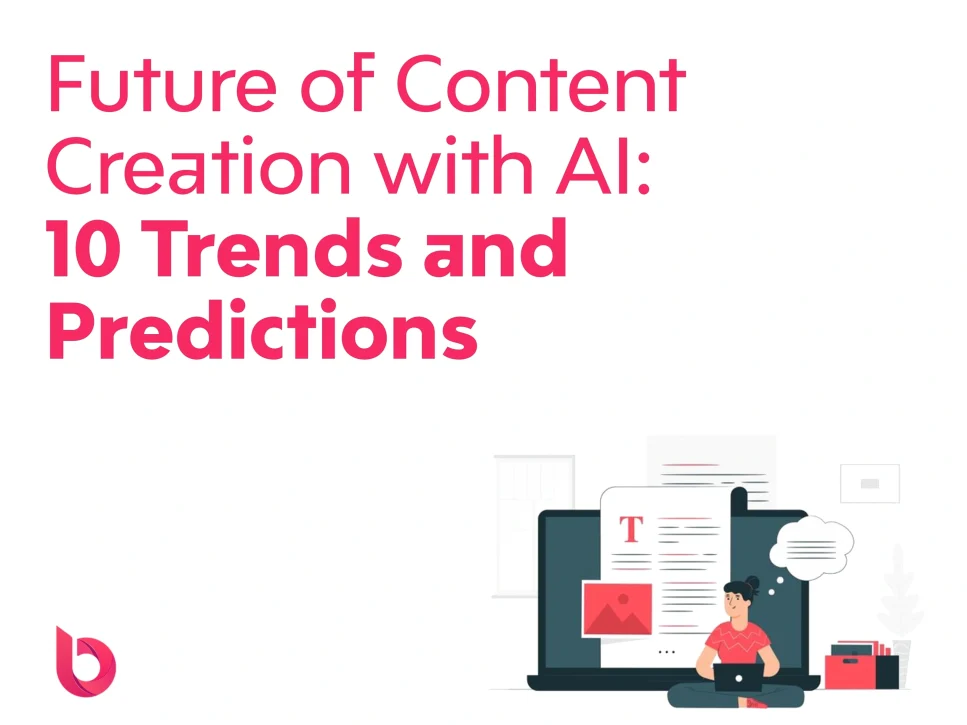Artificial intelligence (AI) has become more than just hype. It is a complete revolution, particularly when it comes to content creation.
From writing blogs and designing images to making videos and generating voiceovers, AI is making content creation faster and more efficient.
Artificial intelligence (AI) has quickly become a game changer in content creation, reshaping how we create, distribute, and consume media.
This isn’t something for the future—it’s happening right now. Keeping up with AI trends is critical for content creators, startups, and businesses looking to stay ahead in the rapidly changing digital world.
As you move into 2025, AI will play an even bigger role in content creation. This blog will explore the future of content creation with AI, the top 10 trends shaping the industry, and what they mean for content creators.
Understanding AI in Content Creation
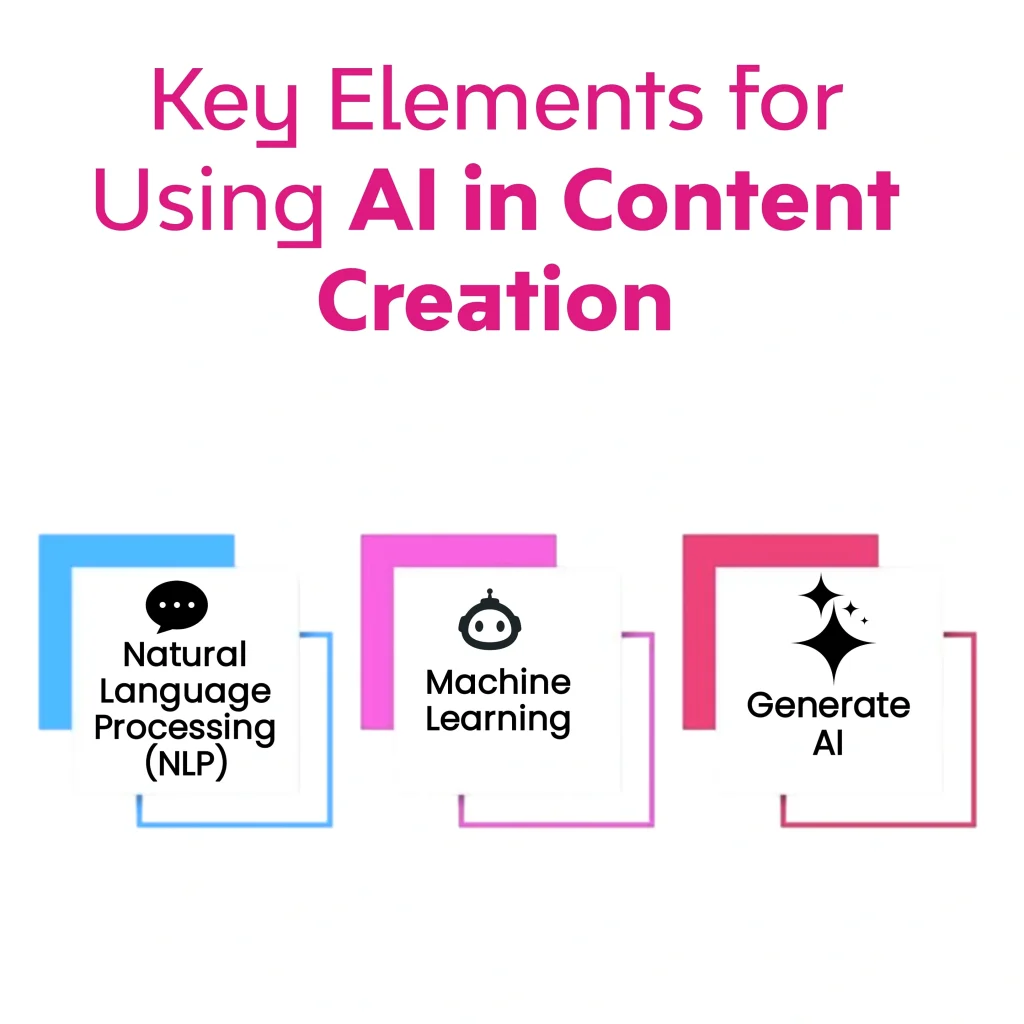
AI helps create content by using smart programs and learning from data. These advanced tools can speed up and improve different creative tasks. Some key technologies include:
- Natural Language Processing (NLP): Helps computers understand and create human-like text, making tasks like writing and translation easier.
- Machine Learning: Lets systems improve over time by learning from data, which helps with content suggestions and personalization.
- Generative AI: Can create new content, like text, pictures, and videos, by recognizing patterns and using given inputs.
These technologies power AI tools that help produce written content, images, audio, and videos—making content creation with AI faster and better.
Enhancing User Engagement with AI-Generated Content
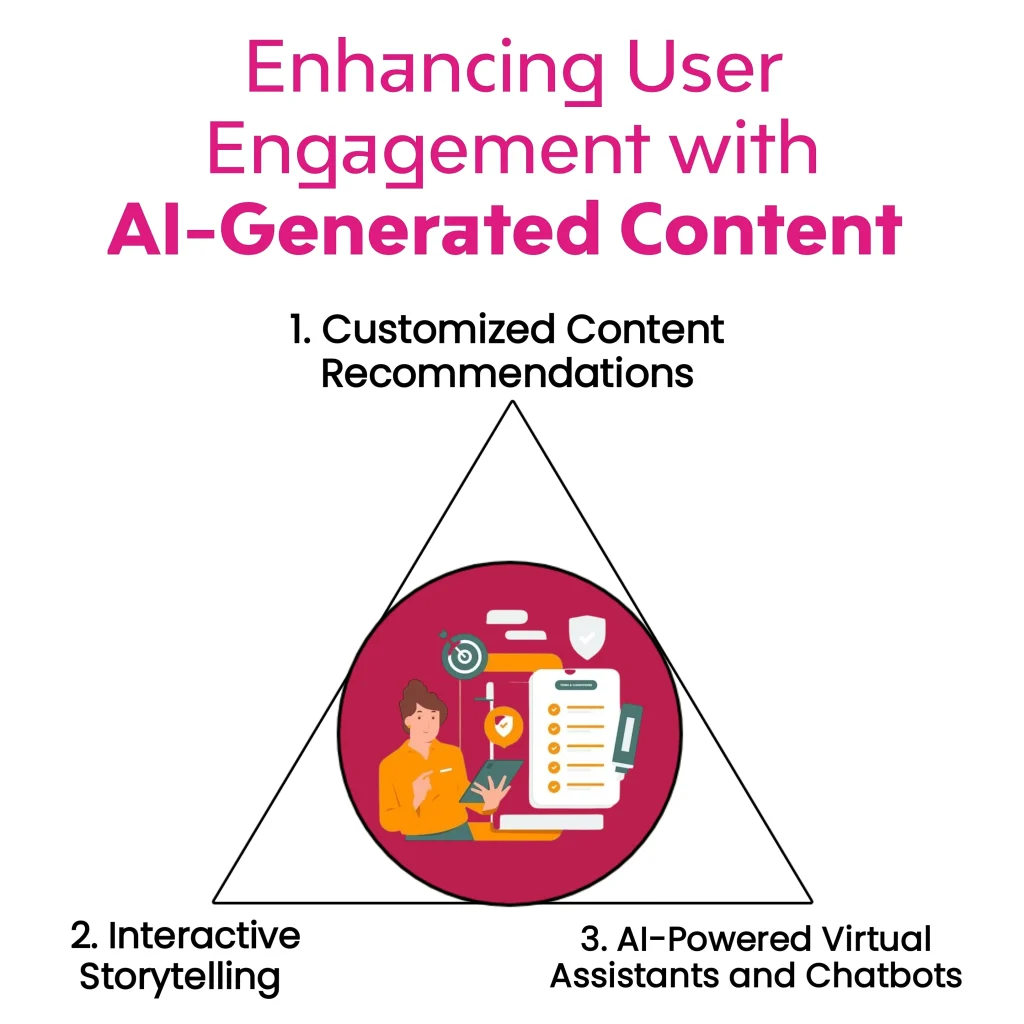
AI is changing the way people interact with content by making it more personal, engaging, and immersive. As AI technology improves, users are moving from just watching or reading to actively participating.
1. Personalized Content Suggestions
AI studies what users like, watch, or listen to and then suggests content based on their interests. Platforms like Netflix, Spotify, and YouTube use AI to recommend movies, songs, and videos, making the experience more enjoyable and increasing engagement.
2. Interactive Storytelling
AI can adjust stories in real-time based on user actions. For example, interactive videos or games can change the storyline depending on choices made by the viewer. This is becoming more common in gaming, online learning, and digital storytelling.
3. AI-Powered Chatbots and Virtual Assistants
Many businesses use AI chatbots and virtual assistants to improve customer support and make content more interactive. Tools like ChatGPT, BlogI, and PeopleBots help users by having automated chats, giving personalized product suggestions, using different AI models, and even creating blog summaries. This makes the user experience better and more engaging.
These technologies power AI tools that help produce written content, images, audio, and videos—making content creation with AI faster and better.
Top 10 AI Trends Shaping the Future of Content Creation with AI
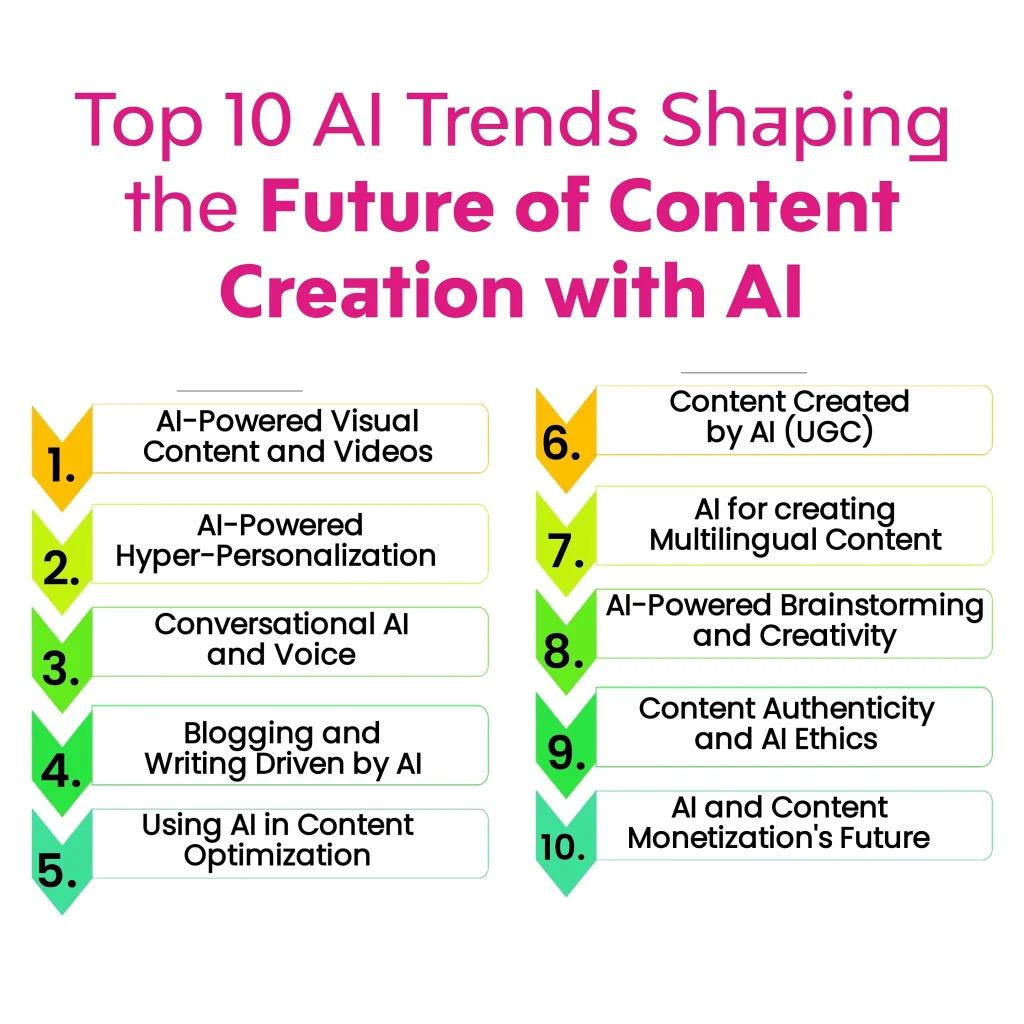
1. AI-Generated Videos and Visual Content
AI tools make creating product videos and digital artwork easy, even for those without advanced skills. The way videos and images are made is changing fast. AI-powered tools can now:
- Edit videos automatically
- Use advanced deepfake technology
- Generate and edit images with tools like Pixci
- Create highly realistic images and videos
These tools help creators produce high-quality visuals quickly and easily.
2. Hyper-Personalization with AI
AI helps create content that matches each person’s interests by studying user data and predicting what they might like. The era of generic content is over. AI now makes it possible to:
- Personalize content in detail with tools like Blogi
- Suggest content based on individual user behavior
- Change content instantly based on user actions
Platforms like Netflix use AI to recommend shows, while AI-powered email marketing tools send customized messages to different groups, increasing engagement and sales.
3. Voice and Conversational AI
AI is changing how we use voice and audio content. Some key advancements include:
- AI-generated podcasts and voiceovers, making production easier and more affordable
- Smart chatbots that sound like real people
- Virtual influencers with unique personalities
Voice-based AI is becoming more common in areas like podcasts, customer service, and brand storytelling. Tools like Voisi and PeopleBots create realistic voiceovers, while chatbots and voice assistants help brands engage with users through interactive conversations.
4. AI-Powered Writing and Blogging
AI is changing how content is written, making the process faster and more efficient. Key advancements include:
- AI tools that create well-structured and relevant content
- Platforms like Blogi, AI Collective, and Copy.ai that simplify content creation with AI
- Ongoing improvements in AI-generated text
These tools help businesses produce blogs, articles, and social media posts quickly while ensuring the content matches their brand’s voice. However, keeping the content original and high-quality remains a challenge for creators.
5. AI in SEO and Content Optimization
AI is making search engine optimization (SEO) smarter and more efficient. Key advancements include:
- AI-powered keyword research
- Predicting which content will perform well
- Advanced analytics to improve rankings
AI helps automate SEO tasks like finding the best keywords, analyzing content, and predicting search rankings. Tools like Tarantula and Clearscope help structure content better, increasing its chances of ranking higher on search engines.
6. AI-Powered User-Generated Content (UGC)
AI is changing how user-generated content (UGC) is created and shared. Key developments include:
- Virtual AI influencers are gaining huge followings
- Smarter affiliate marketing strategies
- AI-powered tools for PR and brand communication
AI is shaping UGC through digital influencers like Lil Miquela and AI-generated social media posts. In the future, AI will play an even bigger role in product reviews and affiliate marketing, helping brands create content on a larger scale.
7. AI for Multilingual Content Creation
AI is making it easier to reach a global audience by removing language barriers. Key advancements include:
- Instant translation tools
- Localization technology that adapts to different cultures
- AI-powered global content strategies
Tools like Voisi and Google Translate help translate voice and text, allowing content creators to connect with people worldwide. AI also ensures content feels natural and culturally relevant for different audiences.
8. AI-Assisted Creativity and Brainstorming
AI is becoming a collaborative creative partner:
- Generating creative ideas and content suggestions
- Providing unique perspectives and unexpected connections
- Enhancing human creativity rather than replacing it
AI is not just about automation—it also acts as a creative collaborator. Tools like Blogi and AI Collective generate content ideas, headlines, and outlines, assisting creators during the brainstorming process. This trend empowers creators to combine their creativity with AI suggestions for better results.
9. AI Ethics and Content Authenticity
As AI plays a bigger role in content creation, ethical issues are becoming more important. Key areas of focus include:
- Finding ways to detect and reduce AI bias
- Making AI-generated content more transparent
- Setting industry rules for responsible AI use
With deepfakes and misinformation on the rise, businesses are working on solutions like AI watermarking and content verification to maintain trust. Tools like Blogi can generate graphics and text using multiple AI models while ensuring transparency.
10. AI and the Future of Content Monetization
New AI technologies are changing how content creators earn money. Key advancements include:
- Highly targeted automated ads
- Personalized ways to make money from content
- AI-powered tools to boost revenue
AI is helping businesses improve ad placement and create personalized advertising strategies. Platforms like Adplify and Google Ads track competitor ads and assist with ad planning. AI also supports content creators by enabling subscription models and revenue-sharing opportunities.
Opportunities for the Future of Content Creation with AI
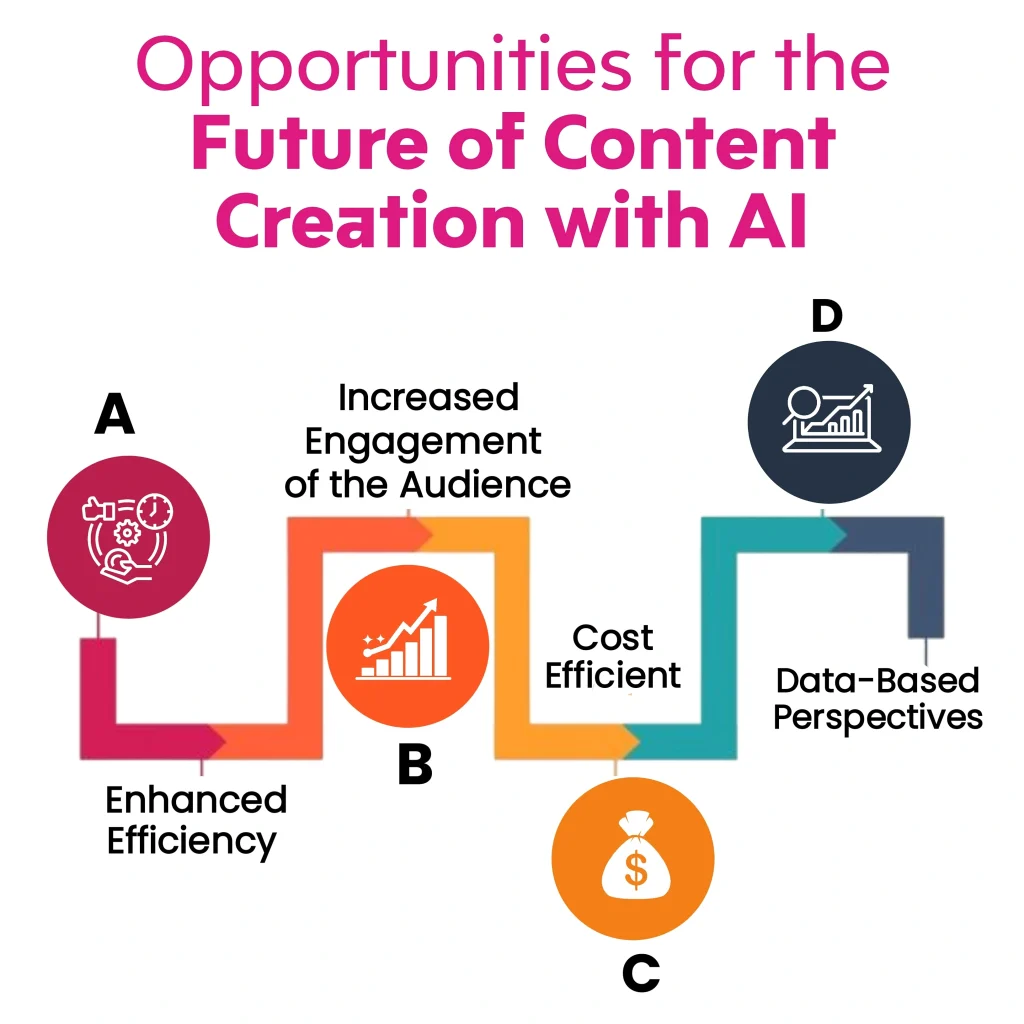
AI empowers content creators by enhancing efficiency, personalization, and analytics, opening up new possibilities for content production and distribution.
1. Increased Productivity
AI automates time-consuming tasks like content research, transcription, editing, and scheduling, allowing creators to focus on strategy and creativity. Tools like Blogi and Pixci streamline workflows, helping creators produce high-quality content faster.
2. Enhanced Audience Engagement
AI-powered recommendation systems personalize content for users, increasing engagement and retention. Platforms like Netflix and YouTube use AI to suggest relevant content, boosting visibility for creators.
3. Cost Efficiency
Producing high-quality article content—graphics and videos—can be expensive. AI-powered tools like Pixci and Runway reduce production costs by automating processes that traditionally require large budgets.
4. Data-Driven Insights
AI tools analyze user behavior, engagement patterns, and SEO performance, helping creators optimize their content strategies. Platforms like Tarantula and Google Analytics offer actionable insights that enhance content effectiveness.
Common Concerns About Content Creation with AI
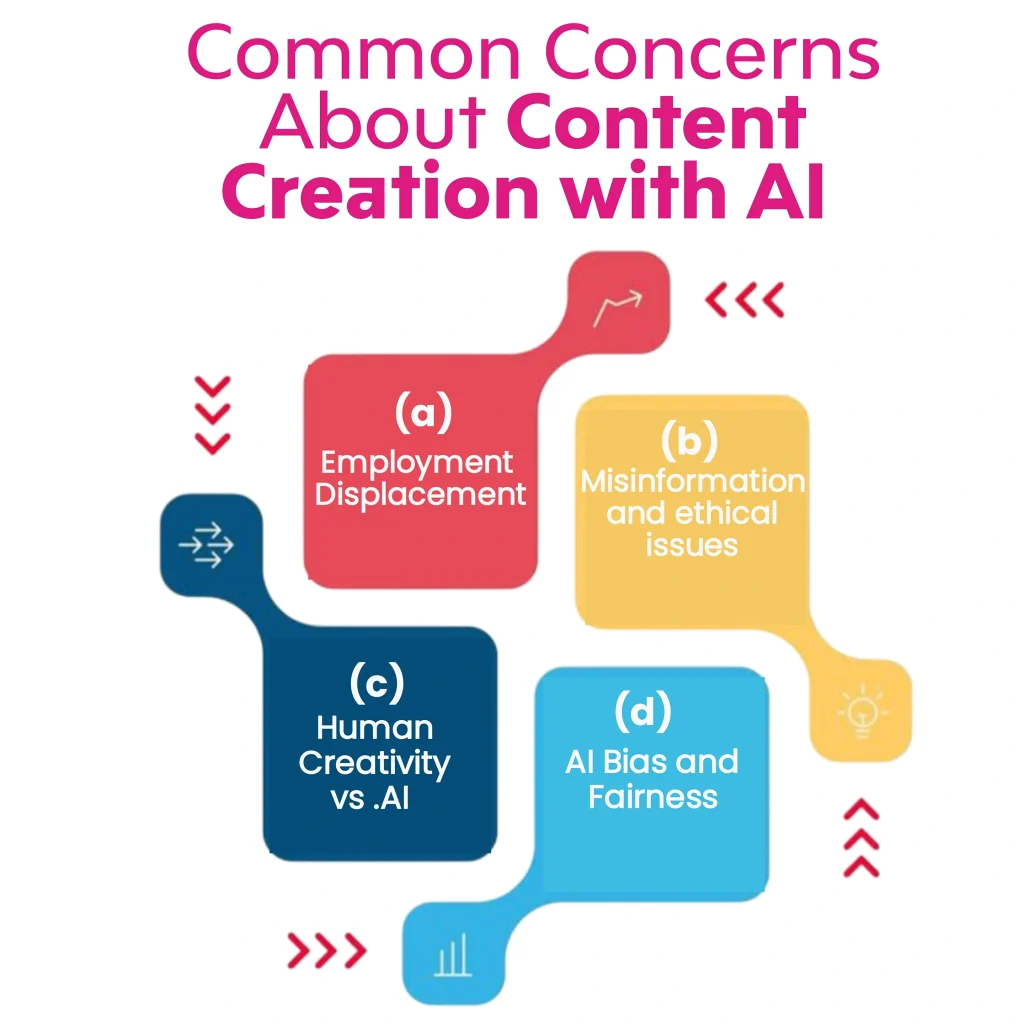
While AI presents numerous advantages, it also raises ethical and practical challenges that creators and businesses must address.
1. Job Displacement
AI automates many tasks, leading to concerns about job losses. However:
- People will still guide strategy, storytelling, and creativity.
- AI will handle repetitive tasks like content writing and data analysis.
- New jobs will emerge, such as AI content management and prompt engineering.
Experts believe AI tools like Blogi AI will support human creativity rather than replace it, shifting job roles instead of removing them.
2. Misinformation and ethical issues
AI-generated content raises concerns about false information and trust.
- AI can produce large amounts of misleading content.
- Verifying sources and attribution becomes more difficult.
- Ethical AI use requires fact-checking, transparency, and clear labeling of AI-generated content.
3. AI vs. Human Creativity
AI can create impressive content, but can it truly innovate?
- AI recognizes patterns and mixes existing ideas.
- Human creativity comes from emotions, experiences, and cultural knowledge.
- AI struggles with humor, irony, and ethical judgment.
Based on historical data, AI can generate high-quality content, but human insight is still necessary for innovative creativity. Users can define styles, develop distinctive personalities, and submit writing samples with tools like Blogi.
4. AI Bias and Fairness
Since AI learns from existing data, it can repeat and even amplify biases.
- AI may reflect past prejudices found in training data.
- Content recommendations can create “filter bubbles,” limiting diverse perspectives.
- AI-generated visuals may reinforce stereotypes or lack diversity.
Ensuring fairness in AI requires careful oversight and continuous improvement.
Conclusion
AI is changing how content is created, making it faster, more engaging, and easier to monetize. As technology advances, AI is becoming a key part of content creation rather than just a temporary trend. The real opportunity is not choosing between AI and human creativity but combining them for better results.
Tools like Blogi AI show this future in action. Unlike traditional AI writing tools that produce repetitive content, Blogi uses multiple AI models to generate more diverse and high-quality content.
The relationship between human creativity and AI will keep evolving. As we move forward, ensuring ethical use and transparency will be essential. The future of content creation with AI is about combining humans and AI to create something even better.
FAQs about the Future of Content Creation with AI
Can AI completely replace human content creators?
How can businesses use AI in content creation?
What are the most effective AI tools for content creation?
Is AI-generated content reliable?
How will AI-generated content affect search engine rankings?
The future of content creation with AI is full of opportunities, but it is up to content creators and businesses to use it ethically and strategically.

